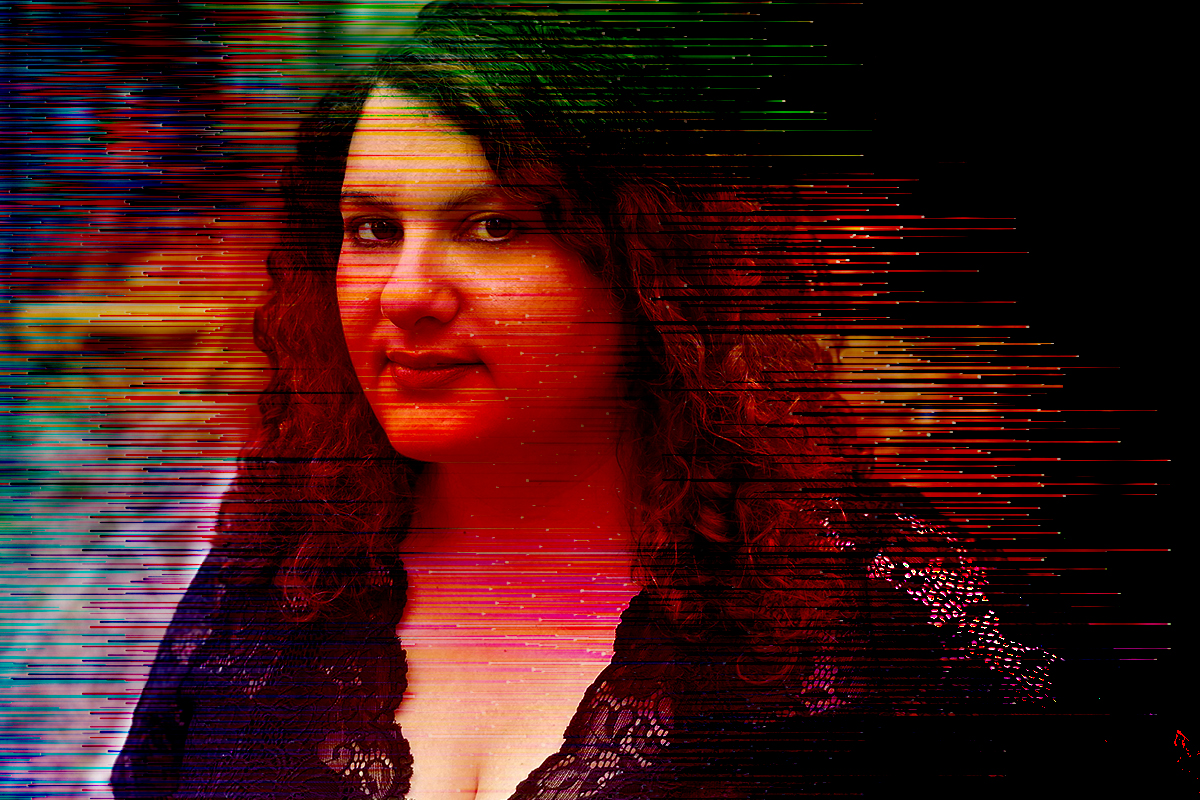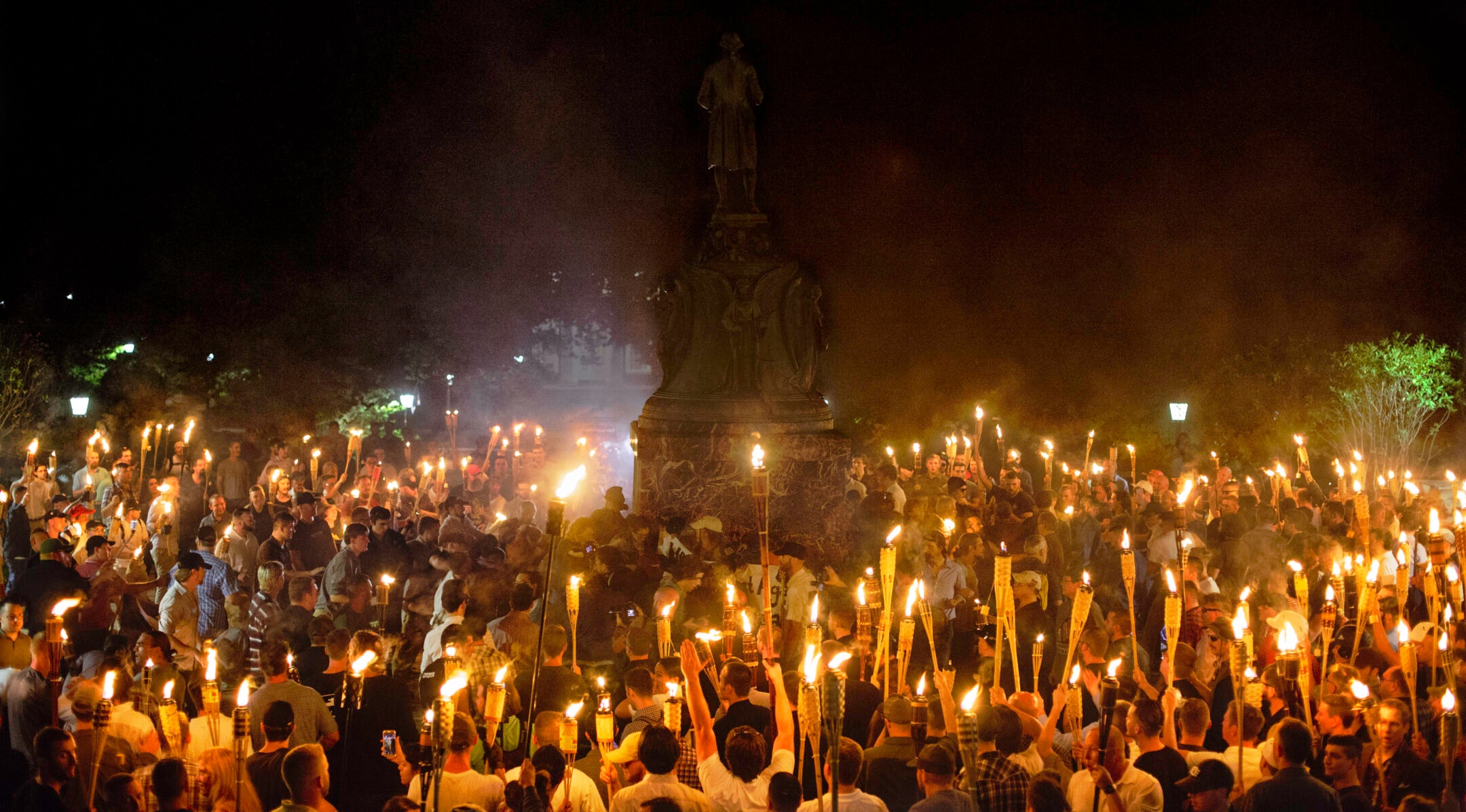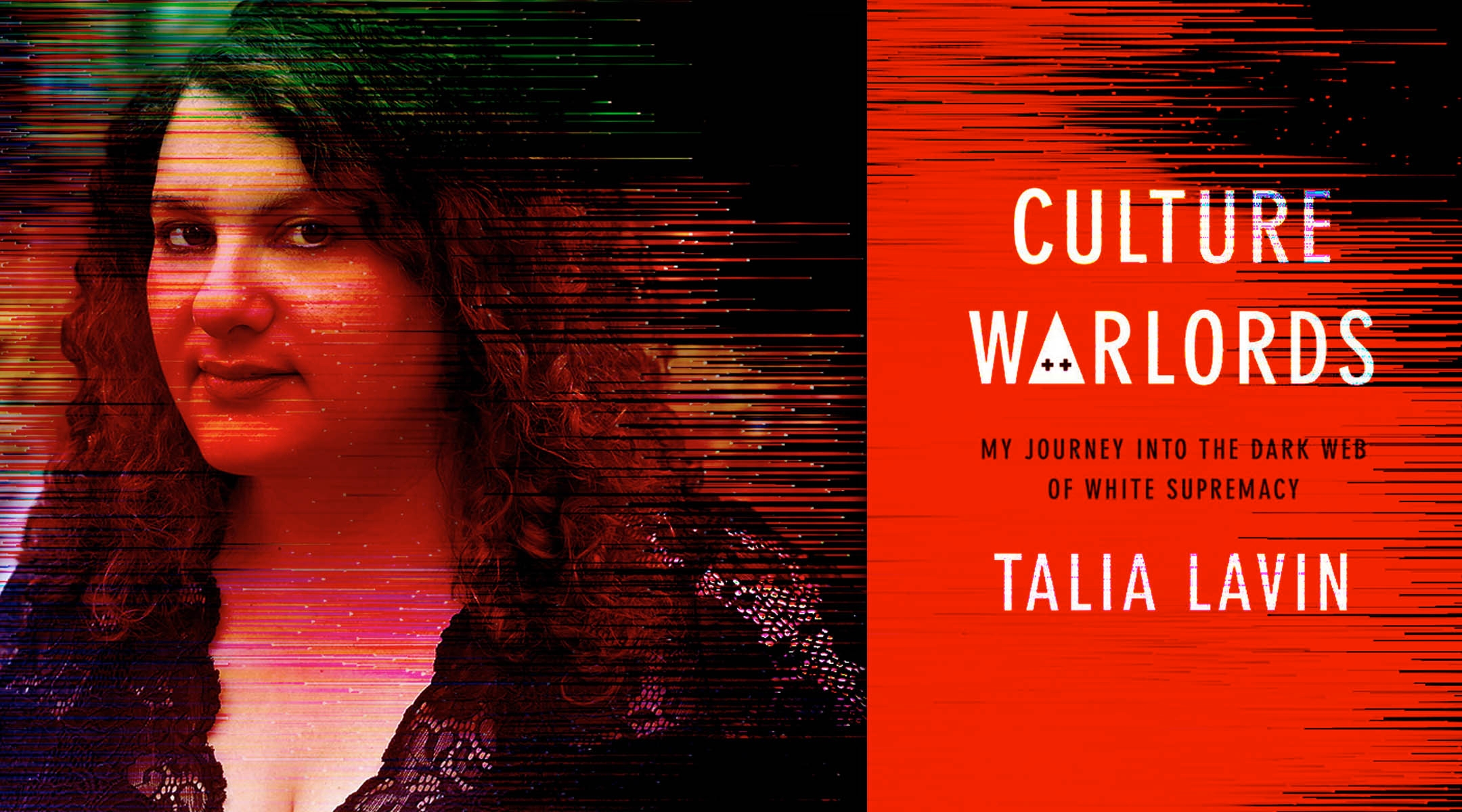This piece originally appeared in Alma.
After over a year of immersing herself into the darkest depths of white supremacy on the internet, Talia Lavin remains hopeful. Lavin, a Jewish reporter, went undercover into some of the most toxic chatrooms the “alt-right” has to offer — and is now telling her story, and the story of the rise of white supremacy in America, in “Culture Warlords: My Journey Into the Dark Web of White Supremacy.”
“When I became the target of the far right, I felt my identity sort of burning inside of me,” Lavin explained to me one afternoon in late August. “As a Jewish woman, I was the brunt of all this anti-Semitism and misogyny. The misogyny is very overt — the threats and abuses are incredibly sexualized. It’s very keyed to my appearance. It’s really hard to disentangle these things, but because of my identity, I was targeted with a viciousness. And because of that viciousness, I decided to turn around and dive in. Not to disengage, but rather to turn towards the darkness — and to fight it.”
Lavin, who previously worked for Alma’s parent company 70 Faces Media, credits her experience at the Jewish Telegraphic Agency as something that made her “re-conceive of anti-Semitism as something that was alive and present, and particularly thriving, on the internet.”

Talia Lavin (Image by Yonit Lavin)
We discussed going undercover, social media platforms, bringing white supremacists into “the light” and collecting swords, among many other things.
This conversation has been lightly condensed and edited for clarity.
I love how, in the intro of your book, you write that to describe white supremacists is deprive them of the power to organize in total darkness — that writing about them is bringing them into the light. Can you talk about this concept?
One of the things that the people who are attracted to far right extremism crave is inspiring fear — being the boogeyman. And I [do] think they are quite dangerous. But to give them this mystique, and to say it’s this insurmountable problem — that it’s not even worth understanding the details — gives them the power that they haven’t earned, and shouldn’t have.
When you really delve into the details, when you look at the roots, when you expose where these sentiments are coming from, what they’re rooted in, who is expressing them and why, you get a better sense of the threat, and you also rob it of this sense of mystery. That is so crucial. So much of far right extremist imagery is the skull mask, the shields, and these sort of elements of disguise. When you pull off that skull mask, and you show the face beneath, I think that you rob them of the power of that sort of vicious Cheshire grin.
How do you personally navigate the internet and social media? How do you deal with your trolls?
Well, I collect swords and I have a crippling panic disorder.
No, but seriously. I got my first sword courtesy of my dad at a “Lord of the Rings” convention at age 14. And then on my 30th birthday, I went to Medieval Times. I started researching this book and I said, I want to get a sword. I was starting to encounter these stories of anti-fascists and journalists who’d had their families threatened — even people coming to their houses, and my parents had received a threat — and I just said, I would like a blade. And then over the course of the past year, I’ve acquired two more. So I now have three swords, and a dagger, that I keep with me, wherever I live. I’m not like a sword wielding expert — I mostly use them for selfies. But I know a few basic moves, and it gives me probably a false sense of security, but at least a sense of like, if someone comes at me, I will grab my blade and have something to parry with.
And then, I have a lot of panic attacks. I’m very outwardly bold and fearless, [but] on the inside, I’m a writhing mass of neurosis held together by tape and glue. But I think if I had to decide whether to dive into this world again, knowing the internal chaos it has provoked, I would do it again.
In the book you write about going undercover into white supremacist chat rooms. How did you keep yourself calm and sane while spending time in these really terrible forums?
I would say saying that I was calm and sane is a bold assumption on your part. But I had comrades. That was the biggest thing. There’s a group of women who I partially dedicated the book to, who are women who cover the far right. And we’ve all faced — some people much more grotesque extremes than me — the sexualized violence of covering this stuff. Having that camaraderie, having those people who understood, was vital. I have the full support of my parents, who would let me just treat myself on their couch and shake.
What about the logistics of going undercover?
Keeping track of the different identities was sometimes a challenge. There are several personas that didn’t make it into the book — entire personas with back stories — just because the research didn’t go far enough. I had a whole “alt-right” woman Facebook profile where I was trying to get into the women of the “alt-right,” and that proved a little more difficult because they are simply less stupid than their compatriots — or have a little less recklessness, typically. At times, I had to consciously remind myself, okay, who am I today? And, what’s my story today? That was definitely interesting. At the same time, so much of my socializing is online, so I was like, Okay, and now I’m Talia again. It was this sort of interestingly fractured consciousness.
At a certain point, as I mentioned in the book, I did have an acrid pleasure in the duplicity of saying, I am exactly who you consider your worst enemy and the type of person that would provoke the most disgust and here I am, having these intimate conversations with you and entering into your hideous circle of camaraderie. That was almost satisfying.
This is gonna sound like a weird question, but did you get any joy — joy might be the wrong word — out of researching this? Were there any moments over the course of researching and writing the book that you were like, ‘hell yeah’?
That moment when the culmination of a five-month operation — when I seduced this Ukrainian neo-Nazi — and he gave me a picture of his face with a license plate of his car, where he lived. He was just totally open to me, and my story was ridiculous! I was like, I’m blonde, I’ve learned Russian. We did these voice notes; I would put on this fake voice that was an octave higher and a little more eloquent than mine, and I would record them in Russian and Ukrainian for him. I said that I learned Russian and Ukrainian in order to go to Donbass, Ukraine and meet white supremacists who were fighting on the front lines. It was the most absurd backstory in the world and this guy was just so horny or whatever that he fell for it.
He really bared his soul to me, and then I gave it right to bellingcat. He totally had an implosion. He tried to bribe the journalists. He deleted all his profile pictures. The chat that he had co-moderated, for a time, collapsed and started putting out all these messages like, don’t be dumb, avoid women. That really gave me a sense of satisfaction, because I feel it is a part of anti-fascist work to sow dissension and prevent coherence in these groups that encourage terror.
The man that I spoke to was constantly sending me photos of guns, of violent video game screenshots where he named his AK-47 “Die Muslims,” talking about how to assemble Pythons. It wasn’t an edge case, where I was like, oh, this is just some kid. He had directly organized to the translation and dissemination of [Christchurch mosque shooter Brenton] Tarrant’s manifesto into Russian and Ukrainian, which was being distributed and featured in photos with extremist groups around Eastern Europe. So, I didn’t feel bad. That was a triumph of holy shit, it worked. And that moment where I said to him, “Hey, I have something I need to tell you. I’m an anti-fascist and you’re about to be exposed, you motherfucker”… that was pretty good.

Neo-Nazis and white supremacists encircle counterprotesters at the base of a statue of Thomas Jefferson after marching through the University of Virginia campus with torches in Charlottesville, Va., Aug. 11, 2017. (Shay Horse/NurPhoto via Getty Images)
On the flip side of that, what did you find to be the hardest moment throughout this process?
A lot of it was hard. One was that moment where I opened up one of the most violent chats on Telegram and found that it was an entire discussion about whether I was too ugly to rape. That was not a great day.
I was really struck by the idea you expand on in the book, that “no hate is an island.” You write, “radicalized misogyny had led users straight into the arms of white supremacy, with its anti-Semitism…” Can you speak more on this idea — on how all these hatreds are inextricably linked?
One of the things I learned — and this I personally learned when I was an extremism researcher at Media Matters — was how to recognize a hate site. For that job, every single day, I went through an array of different extremist news sites and forums and wrote up a newsletter of basically “what is the far right talking about today.” Is there a persistent featuring and foregrounding of news stories about a group that you’re demonizing? I noticed that on the incel sites, there was always, every time I visited, reporting [on] crimes by women. And so I said, this is very similar to the hate sites I visited, it’s just directed towards women — half of humanity. In other words, the techniques of dehumanization were very similar. And then I started delving deeper into those sites themselves, and realized white supremacists are actively recruiting here, even though it’s pretty evenly divided between white and non-white. Yet, because these are communities organized around radicalization, organized around hated, pretty much everything is all lined up.
Anti-feminism is very often an entrée to the broader “alt-right” and far right. It’s a very soft sell to men who might feel alienated, and even some women who might feel like, we still get a pretty raw deal in this world. So blaming everything that’s wrong on feminism — like, “oh, they’re putting too many women in action movies” or “I don’t like that video games are covering up boobies” — that process is basically saying: question social orthodoxy, question these narratives that are supposed to lead to social justice, and here are the ways they’re hurting you, the downtrodden man.
If you start from there, there are many other orthodoxies that seem ripe for questioning: Is racism really bad? Are the Jews controlling the world? Once you start someone down a journey of “here’s how you’ve been harmed by these purported socially just ideologies, the reason for your malaise and dissatisfaction,” it’s a long, greasy slope with plenty of people ready to lube up the way for you, straight down into the pit.
Do you think social media platforms and internet providers should be doing more about Nazis and white supremacists and the “alt-right”? And if so, what should they be doing?
Yes, is the long and short of it.
Just to bring it up to the present day, the events that directly led to the shooting of two protesters in Kenosha, Wisconsin was reported 455 times to Facebook and was not removed. I think Facebook in particular has made peace with far right extremism on its platform. And that is a very dangerous thing that they’re doing. It’s a deal with the devil they’ve made: It maximizes their profit, but it is very harmful to the body politic. Twitter has been better, they’ve worked harder, but there are many, many, many Nazis flourishing on their platform as well.
ISPs [internet service providers] in general — I mean every single hate site that I go to has service providers. To me, if you’re enabling Nazi speech, you are more of an ideological fellow traveler than you might claim to be. Nazis were using the internet very early on. In the ’80s, the Klan had a website. They very quickly realized it was a way to propagandize and to recruit with relative anonymity.
In creating these social media platforms, it’s not as if this problem couldn’t have been anticipated. The Silicon Valley mentality of “grow fast and break things,” well, a lot of people have been broken by doxxing, harassment, swatting, by racial abuse, by misogynistic abuse. A lot of people self censor, a lot of people leave, a lot of people face the experience of having the roof torn off your life where you’re suddenly a star on the far right for usually something relatively innocuous.
I am not a gajillionaire tech executive, but I think content moderation has to be taken more seriously and given more resources — and not given out to contractors who get pennies on the dollar and no mental health support. It has to be as integral as UI, as the other aspects of the social media experience that get so much money and attention.
How does it feel to release “Culture Warlords” at this particular moment in time, in this sort of heightened atmosphere of hate?
The regretful part of publishing a book about current events is that there’s inevitably a months-long lag between when you finish and when you publish. As I was putting the very finishing touches on the book, it was about maybe a week, or just after, the George Floyd protests had begun. So in a way, it felt like I am writing a book for a world that has already changed. The book is already obsolete.
But, some of the underlying narratives that I talk about — particularly in the ways white nationalist rhetoric inevitably leads to violence, and the ways in which accelerationism has taken over and edged out electoralism on the far right — I think that holds true, and I think that can hopefully provide some valuable insight into readers as to why this radicalization keeps amping up and why these violent incidents keep happening.
We’ve had 500 separate attacks on protesters since the George Floyd protests began — car attacks, mace-ings, beatings, shootings — and three deaths, [caused] by paramilitary and armed far right activists. That is just going to keep accelerating, particularly with the explicit encouragement of the Republican political establishment, including the president. While I inevitably have been outpaced by the news, what I lay out are some of the fundamental dynamics that are driving these headlines. To my regret, the book will only become more true.
With regards to the anti-fascist chapter, I felt a bit of hope, like, wow, there’s people really out there fighting for better. Do you have any hope for where this country is headed? It’s okay if the answer is no.
I would say that any hope I have is from my comrades, from camaraderie. From knowing that there are people who have done this work before I was born, who will keep doing it after I die. To feel like you’re part of a link in a chain of people who stand up and say, no, I won’t allow this. Who say that with their bodies, who say that with their actions, and who say that with their words. I am awed by the bravery of the people I encountered researching this book and beyond it.
The hope is in the people.
JTA has documented Jewish history in real-time for over a century. Keep our journalism strong by joining us in supporting independent, award-winning reporting.






